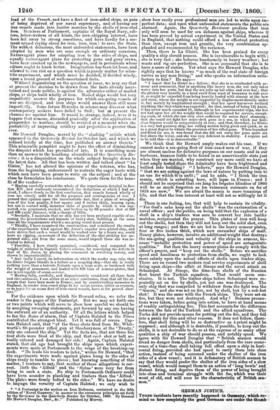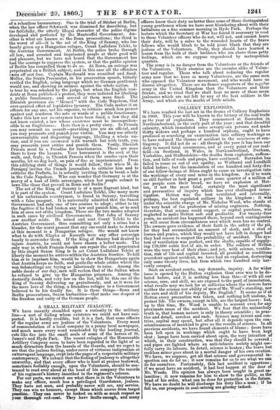GERMAN JUSTICE.
THREE incidents have recently happened in Germany, which re- mind us how completely the good Germans are under the thumb
of a relentless bureaucracy. One is the trial of Stieber at Berlin, when the law officer Schwarck was dismissed for describing, but too faithfully, the utterly illegal character of the police regime developed and perfected by the Manteuffel Government. An- other is what are known as the Bonn prosecutions ; the third is the worst of all—it is the act of the King of Saxony, who has basely given up a Hungarian refugee, Count Ladislaus Teleki, to the Austrian Government. At Berlin, the police broke through all law, and arrested and imprisoned people at their good will and pleasure, but we have not heard that the Government has had the courage to suppress the system, or that the public opinion of Berlin has compelled them to do so. At Bonn, an outrage was perpetrated on a British subject, and in this case all the offenders came off scot free. Captain Macdonald was assaulted and fined. Muller, the Staets Procurator, in his prosecution speech, bitterly reviled the English, using language which no German gentleman would use, and showing an ammus against the whole nation. It is true he was rebuked by the judge, but when the English resi- dents at Bonn published a protest, they were indicted for libelling a public functionary, and several of them were fined. The Rhenish provinces are " blessed " with the Code Napoleon, that over-praised effort of legislative tyranny. The Code makes it an offence for any one, not his superior, to criticize much less protest against and condemn the acts or words of a public functionary. Under this law our countrymen have been fined, a law they did not know existed, a law whose existence must be incomprehen- sible to an Englishman. Here then is a pretty story. In Prussia you may commit an assault—providing you are an official, and you may prosecute and punish your victim. You may use utterly unwarrantable and disgusting language, libelling a whole na- tion, and if you are answered with warmth but with truth, you may prosecute your critics and punish them. Verily, Rhenish Prussia must be a Paradise for functionaries. There are none there to keep the keepers. Your bureaucrat is the cock of the walk, and, truly, in Rhenish Prussia when the oracles open their mouths, let no aog bark, on pain of fine or imprisonment. From this edifying state of things it would follow, that when M. de Persigny invites the French journalists to criticize him and to criticize the Prefects, he is actually inviting them to break a hole in the Code Napoleon. Who can wonder that Germany is at the mercy of a host of little sovereigns, when her people submit to laws like those that prevail in Bonn and Berlin?
The act of the King of Saxony is of a more flagrant kind, but it is part of the system. Count Ladislaus Teleki, like many more of his unfortunate comitrymen, is found in Saxony, travelling with a false passport. It is universally admitted that the Saxon Government had only one of two courses to adopt ; either to try, the fugitive if he had broken any law and punish him, or to send him at once out of the kingdom. These are the two modes adopted in such eases by civilized Governments. But John of Saxony saw another mode. He seized and sent Count Teleki to the Austrian Government, thus committing not only a crime but a blunder, for the worst present that any one could make to Austria at this moment is a Hungarian refugee. She would not know what to do with Klapka or Kossuth were any other sovereign basely to surrender them. If the King of Saxony had desired to injure Austria, he could not have chosen a better mode. The only way in which Francis Joseph can repair the evil perpetrated by this stupid Saxon King is to set Count Ladislaus Teleki at liberty the moment he arrives within the Austrian frontier. To kill him or to imprison him, would be to show the Hungarians again that Austria keeps no faith, and perils the whole edifice which the von Sohmerlings are trying so laboriously to raise. Among the noble deeds of our day, men will reckon that of the Sultan when he refused to give up the Hungarian prisoners. Among the dastardly deeds, and very low on the list, will be this one of the King of Saxony delivering up gratuitously, and as it were for the mere love of the thing, a friendless refugee to a Government believed to be his deadly foe. It is these things—Bonn and Berlin prosecutions, Saxon barbarities—that make one despair of the freedom and unity of the German people.



























 Previous page
Previous page